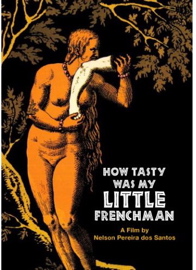| Release List | Reviews | Price Search | Shop | Newsletter | Forum | DVD Giveaways | Blu-Ray/ HD DVD | Advertise |
| Reviews & Columns |
|
Reviews DVD TV on DVD Blu-ray International DVDs Theatrical Reviews by Studio Video Games Features Collector Series DVDs Easter Egg Database Interviews DVD Talk TV DVD Talk Radio Feature Articles Columns Anime Talk DVD Savant HD Talk Horror DVDs Silent DVD
|
DVD Talk Forum |
|
|
| Resources |
|
DVD Price Search Customer Service #'s RCE Info Links |
|
Columns
|
 |
How Tasty Was My Little Frenchman
|
||||
How Tasty Was My Little Frenchman is a witty tale about a tribe of naked Brazilian savages and their violent contact with the encroaching Europeans. Veteran Brazilian director Nelson Periera dos Santos (Vidas Secas) fashions a fascinating vision of life among the cannibals that makes us think about the eradication of America's indigenous peoples.
Watching How Tasty Was My Little Frenchman is almost like watching One Million Years, B.C.: Since everyone is talking in a foreign language the hero barely understands, the film is an almost comic examination of two cultures in conflict. Our hero protests that he's French, and even the native warrior chief decides that his language sounds like that of a Frenchman, not a Portuguese. But the ritual of slaying and eating captured enemies is strong in the Tupinambá tribe, a balanced little community of beautiful naked people that divide their time between enjoying nature and waging bloody war on their neighbors. Our Frenchman is in a bind from the beginning. Deciding that he's an edible Portuguese seems more a matter of appetite than logic, even though the Frenchman strives to prove how useful his two little cannon can be during war raids. The chief gives the Frenchman "eight moons" to live and assigns a young widow to take care of him; he's soon cutting his hair after Tupinambá fashion and participating in battles. The Frenchman is also stark naked along with the rest of the cast, giving How Tasty Was My Little Frenchman its only troubling detail: how does he avoid becoming horribly sunburned? The Frenchman's beautiful new wife seduces him and treats him as a precious object, all the time referring to him as "My little neck." That's the part of his body that the chief says will become her personal meal. The heathen Tupinambas believe that by consuming an enemy, they incorporate his spirit, personality and special strengths. The conquering Europeans talked about 'assimilating' native populations into their superior social systems, which usually meant the eradication of tribal religion and customs, if not outright extermination. These tribesmen are doing the same thing, more honestly. The Frenchman may be consumed, but he'll become part of everyone who eats him, and therefore truly enter the tribe. When Seboipepe says she'll eat him, it's a twisted term of endearment. She loves him like a husband, but in eight moons he's going to be dessert. The greedy trader makes the French captive work for him in exchange for a vague promise to help him escape. A jar of gold coins immediately comes between the two Europeans, with predictable results. The Frenchman develops a secret escape plan with a hidden canoe ready to go. Unfortunately, the Tupinambás haven't survive hundreds of years in the wild by being stupid. In How Tasty Was My Little Frenchman we learn along with the Frenchman how life in the native village functions. Tribal ways are simple and direct, with a most communal activity centered on the paternal chieftain figure. Although the wall-to-wall nudity reportedly kept the film out of some festivals, we soon adjust to all the naked people. Unlike many stories about primitive cultures, the tribal camp looks clean and the natives healthy. The picture also doesn't dwell on violence or sex scenes. The film maintains its satiric edge by periodically introducing quotes from the notebooks of early explorers, commenting on the weirdness of the tribes they have discovered. Although How Tasty Was My Little Frenchman hastens to its only logical ending, a text postscript assures us that 'justice' would soon be done. Within a decade, the newly appointed governor of Brazil will start a campaign of extermination against the many native tribes. An entire civilization would soon be wiped out. New Yorker's DVD of How Tasty Was My Little Frenchman is a good-looking disc mastered from excellent printing materials. The flat image is colorful and the soundtrack brims with unusual native music composed by Guilherme Magalhaes Vaz and José Rodrix. Columbia University film instructor Richard Peña talks at length on the film in an interview, but Dos Santos biographer Darlene L. Sadlier's liner notes are more concise and informative. Brazilian native Ailton also speaks on camera, praising How Tasty Was My Little Frenchman's a positive image of tribal peoples.
On a scale of Excellent, Good, Fair, and Poor,
How Tasty Was My Little Frenchman rates:
Review Staff | About DVD Talk | Newsletter Subscribe | Join DVD Talk Forum |
|
| Release List | Reviews | Price Search | Shop | SUBSCRIBE | Forum | DVD Giveaways | Blu-Ray/ HD DVD | Advertise |






